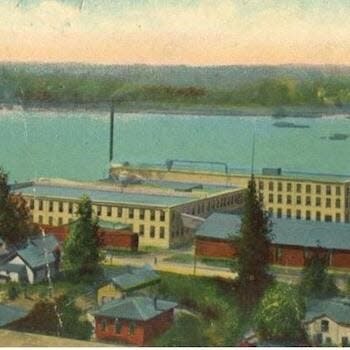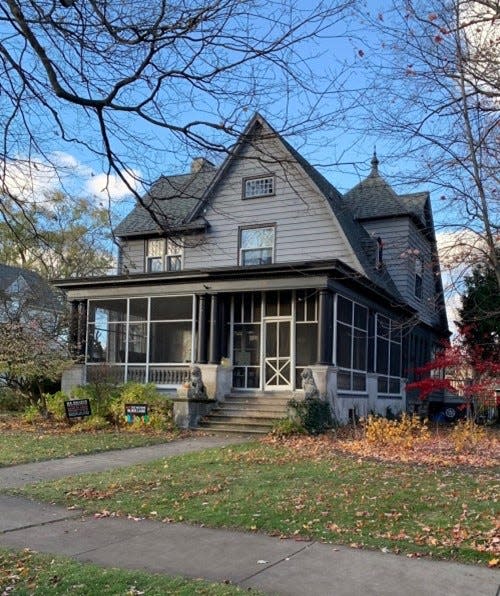Steve VanderVeen: George Hummer and the creation of West Michigan Furniture
George Hummer created one of Holland’s first mass-production factories.
Hummer was born in 1856 in New Jersey. His father’s name was Peter Snyder — but, when he was six months old, George Hummer and his family adopted him.
More History: Holland entrepreneurs Pfanstiehl and Plugger
More History: Nathan Kenyon and Holland's banking history
More History: Arend Visscher and James Huntley lived on a hill
When he was a young boy, the Hummers moved to Grand Rapids, Michigan. There, George attended public school. He later graduated from the Northern Indiana Normal School in Valparaiso, Indiana (later Valparaiso University).

In 1882, Hummer became Holland’s superintendent of schools, a post he kept for seven years. In that time, he increased enrollment in the high school and became known for his public relations, teaching and disciplinary abilities.
In 1885, George married Marguerite Plugger, daughter of Aldert Plugger. Plugger had a flour mill near the foot of Maple Avenue and Eighth Street, as well as a shipping business. In 1856, in the parlor of his house on Eighth Street, where the Warm Friend is today, Plugger hosted Holland’s first banker, Nathan Kenyon.
In 1885, George and Margaret married. They raised three children in their James Huntley-built home at 191 W. 12th St. — Hilda, Marguerite and Kate..
In 1889, with Margaret’s inheritance, Hummer formed West Michigan Furniture with partners Frank W. Hadden and Frederick Metz on the old Plugger Mill property. The company, which initially made "low to mid-end" traditional bedroom and dining room furniture for customers on the East Coast, was at once profitable.
At its first anniversary, the company employed 100 people. Soon thereafter, Hummer installed Edison lights, bolstering the company’s efficiency on Holland’s dark winter days.
In 1892, Hummer — along with William Beach, Cornelius DeRoo, John C. Post, Isaac Cappon, Dr. Henry Kremers and others — formed the Holland and Chicago Transportation Company, which ran steamers between Holland and Chicago. Like most of them, Hummer was also an influential shareholder in First State Bank.

During the deep recession that followed the Wall Street Panic of 1893, 300 of West Michigan Furniture’s employees went on strike when Hummer forced them to pay 1 percent of their wages for accident insurance. Hummer didn’t flinch — even though he was running for mayor as a Democrat.
He fired the alleged agitator and, in an open letter to the Ottawa County Times, criticized labor organizations. Still, he managed to defeat Edward Harrington. While his action may have offended pro-labor voters, it may have pacified pro-business and law-and-order voters — many of whom believed strikes were both illegal and anti-Christian.
In 1894, Hummer retained the mayor’s chair by defeating Isaac Cappon. In 1896, fire destroyed West Michigan Furniture. Hummer had it rebuilt.
In 1898, Hummer made substantial business transactions. The West Michigan Furniture Company bought the West Michigan Seating Company, increasing its total employment to over 600 people.
Then, Hummer divested his interest in the Holland and Chicago Transportation Company to invest in the Interurban. He also helped form the Holland Sugar Company.
In 1900, George and Maggie Hummer moved to Grand Rapids.
In 1904, the West Michigan Furniture Company bought a controlling interest in the Engel Lumber and Land Company in Louisiana. In 1905, Hummer became one of the founding investors in Peoples State Bank.
Between 1910 and 1920, Hummer successfully incorporated Henry Ford’s assembly-line methods into his factory. He also installed his son-in-law, Charles Kirchen, husband of his daughter, Maggie, as president.
Subscribe: Learn more about our latest subscription offers!
Then, in 1920, he again agitated workers when he decreased their wages by 10 cents an hour, telling them that other companies in Holland would soon be doing the same. That same year, Hummer died from injuries sustained in an automobile accident near his home in Grand Rapids.

After his death, Kirchen, who was also president of People’s State Bank, became the sole owner of West Michigan Furniture. By that time, the company was specializing in phonograph cabinets and mahogany beds for high-end hotels. During the World War II years, it made bunk beds. In the 1950s to 1970s, it made beds for colleges, hospitals and motel chains.
In 1976, the Padnos Iron and Metal Company bought West Michigan Furniture. Four years later, the Mueller Furniture Company bought the West Michigan Furniture business, and Padnos retained the property.
Today, West Michigan Furniture’s original office building still stands on Eighth Street near the foot of Maple Avenue.
Information from this story comes from Robert Swierenga’s "Holland, Michigan," MI Gen Web and The Holland City News Archives.
— Steve VanderVeen is a resident of Holland. For a limited time, receive access to his history series at kickstarter.com/projects/holland-me/holland-and-me-the-series.
This article originally appeared on The Holland Sentinel: Holland History: George Hummer and West Michigan Furniture

